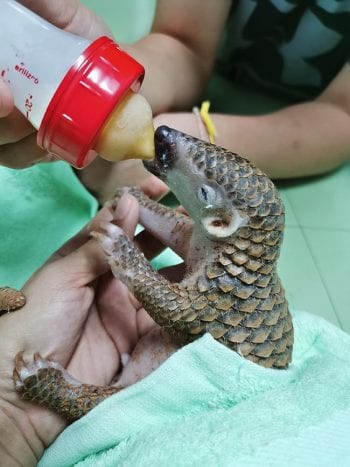28 May 2020
Kitten-sized infant is rescued from the side of the road in Thailand and nursed back to full health by a team from the Zoological Society of London.

Hope was found by the roadside. Image © ZSL/Mahidol University
A baby pangolin has been nursed back to health in Thailand by international conservation charity the Zoological Society of London (ZSL) after the critically endangered animal was found by the roadside last month by a local villager.
The ZSL immediately alerted key partners from Thailand’s Department of National Parks, Wildlife and Plant Conservation, while dispatching its in-country team – accompanied by a wildlife vet from Mahidol University – to rescue the young Sunda pangolin.
Named Hope by his rescuers, the kitten-sized infant – estimated to be a month old – was at first not expected to survive.
But after round-the-clock care Hope has gained weight, is snacking on ant eggs, and has been spotted practising climbing skills in his temporary home – all signs that he can hopefully be released back into the wild.

ZSL conservationist Eileen Larney said: “It’s been an anxious few weeks for the ZSL team taking care of Hope. He’s the first infant we’ve ever rescued so it’s certainly been a steep learning curve – getting him to accept bottle feeding and making sure he has 24-hour care.
“ZSL consults with pangolin experts globally and are fortunate to work in close partnership with Mahidol’s local wildlife veterinary team to provide the best care possible.
“We’re now assessing whether Hope can be released into the wild, but even there, like all pangolins, he sadly faces an uncertain future.”
Pangolins are thought to be the most trafficked wild mammal in the world and all eight species are now threatened with extinction due to widespread poaching.
A seizure of pangolin scales in Malaysia last month weighed six tonnes, representing up to 10,000 individual animals, and estimates have suggested more than 300 pangolins are poached from the wild every day.
Hope is the third pangolin rescued in Thailand in April through the ZSL’s Pangolin Protector network – the other two, both females, were assessed and released back into safe, monitored locations in the wild.
To find out more, visit the ZSL website.